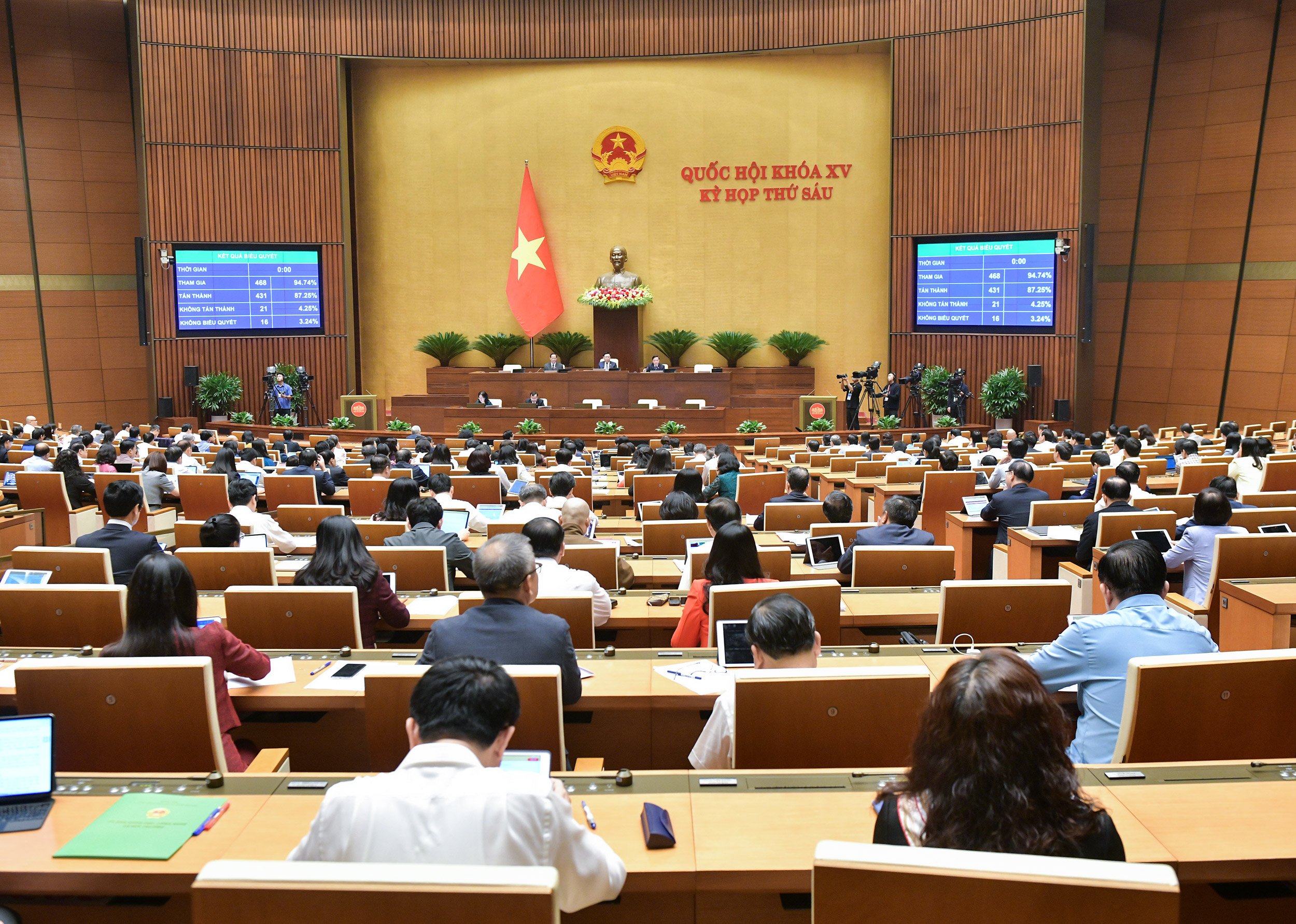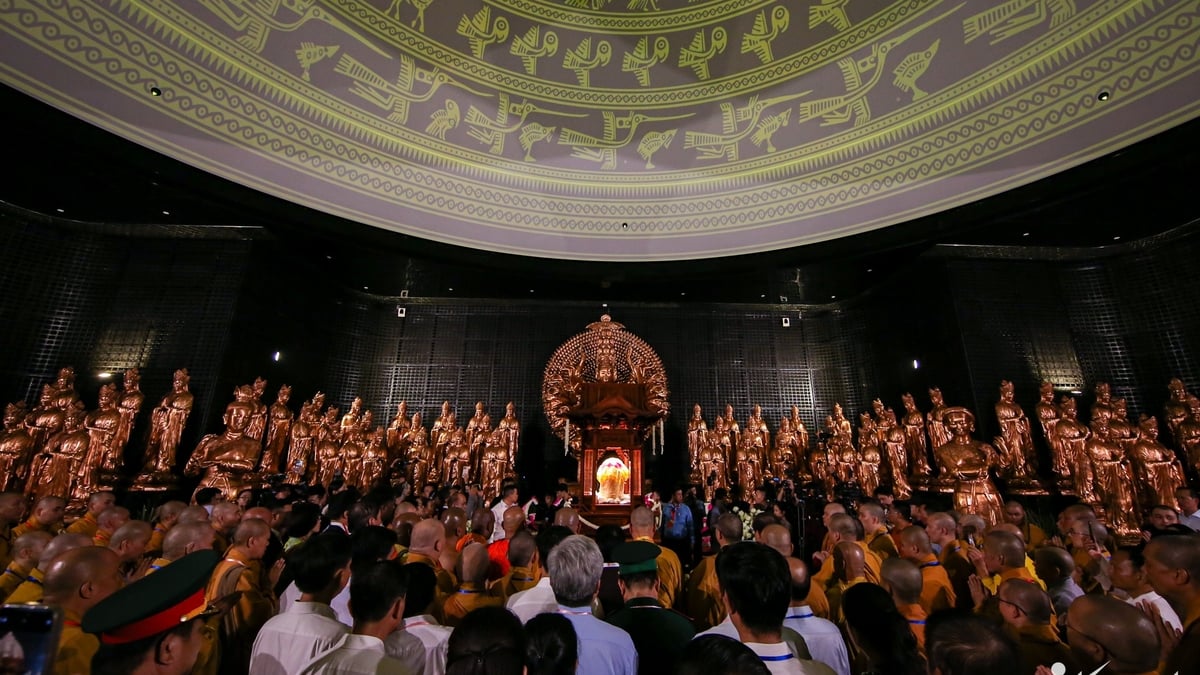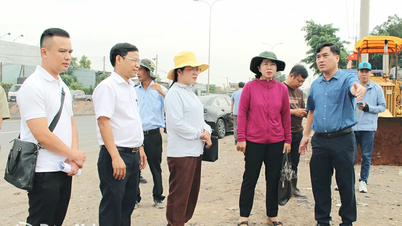On the morning of November 27, with 431/468 delegates participating in the vote in favor (accounting for 87.25%), the National Assembly officially passed the Law on Identification consisting of 7 chapters and 46 articles, effective from July 1, 2024.
Before the delegates pressed the button, Chairman of the National Assembly's Defense and Security Committee Le Tan Toi presented a summary report explaining, accepting, and revising the draft Law on Identification.
Accordingly, regarding the name of the draft Law and the name of the ID card, there are opinions that in the recent past, there have been many changes in the form, content and name of the ID card. Therefore, it is recommended to consider the name of the Law; it is recommended not to change the name of the Law and the name of the card to ID card.

The National Assembly has officially passed the Law on Identification.
Mr. Le Tan Toi said that through discussions at the 6th Session and the meeting of the National Assembly Standing Committee (NASC) between the 2 sessions of the 6th Session, 15th National Assembly, most of the opinions of the NA deputies agreed with the name of the draft Law and the name of the ID card as explained in Report No. 666 dated October 24, 2023 of the NASC explaining, accepting and revising the draft Law on ID.
The Standing Committee of the National Assembly believes that the use of the name Law on Identification clearly demonstrates its scientific nature, both covering the scope of regulation and subjects of application of the Law, and being consistent with the trend of digital society management.
With the scientific integration of all information in the ID card along with the form and method of digital management ensuring mass adoption, the name change to ID card will help make State management more scientific, serving the digital transformation, digital economy, and digital society of the Government;
At the same time, create favorable conditions and support for people to participate in social activities as well as administrative and civil transactions more and more conveniently.
From the above issues, the Standing Committee of the National Assembly finds that the use of the name Law on Identification and Identity Cards is appropriate for the purpose of management and serving the people. Therefore, the Standing Committee of the National Assembly proposes that the National Assembly keep the name Law on Identification and Identity Cards.
Regarding the collection, updating, connection, sharing, and exploitation of information in the Identity Database (Article 16), there is a proposal to add regulations on the collection of biometric information on irises to Point d, Clause 1, similar to the collection of biometric information on DNA and voice to ensure feasibility and suitability with practical implementation conditions.
Mr. Le Tan Toi affirmed that current science has proven that, along with fingerprints, a person's iris has a complex and unique pattern structure for each person, which does not change much over time.
Therefore, in addition to collecting fingerprints, the draft Law has added provisions on collecting irises in identification information to serve as a basis for cross-checking and verifying each individual's information; supporting in cases where a person's fingerprints cannot be collected. Therefore, the Standing Committee of the National Assembly proposed that the National Assembly keep this content as in the draft Law submitted to the National Assembly for approval.
Explaining and receiving opinions on cases of issuance, re-issuance of ID cards, the Standing Committee of the National Assembly received opinions of National Assembly Deputies, revised this content as in the draft Law and would like to report as follows:
When citizen information stored and encoded in the ID card storage unit has errors, it must be updated and adjusted to ensure that the information on the card accurately reflects reality and is consistent with information in databases, information in electronic ID cards, etc., meeting the requirements of correctness, sufficiency, liveness, cleanliness, as well as the rights of citizens when conducting transactions.

Chairman of the National Assembly's Committee on National Defense and Security Le Tan Toi presented a summary report explaining, accepting and revising the draft Law on Identification.
Therefore, in case of not having to change the ID card, citizens must carry out procedures to adjust and update information.
To handle this case, in addition to adjusting Point d, Clause 1, Article 24, the Standing Committee of the National Assembly directed to add the content assigning the Government to "prescribe the order and procedures for updating and adjusting information on the ID card" in Clause 6, Article 22 as in the draft Law submitted to the National Assembly for approval.
Regarding the issuance and management of electronic identification cards, there are opinions agreeing on the necessity of regulations on electronic identification cards in the draft Law. There are opinions requesting further reports on the security issue of chip-based identification cards because they are susceptible to intrusion and monitoring.
According to Mr. Le Tan Toi, current ID cards are manufactured using advanced technology, have high security capabilities, and ensure against card counterfeiting. The electronic chip on the ID card has authentication technology through fingerprint or face matching to accurately authenticate the cardholder.
Accordingly, when a person uses a device to read information stored in an electronic chip, he or she must have the cardholder's consent through fingerprint or facial authentication to gain access to the reading application and retrieve data. Without this operation, no one can access to retrieve information in the ID card.
In addition, to exploit information in electronic chips, specialized equipment must be used and these devices must be provided with security codes by the Ministry of Public Security for authentication, ensuring security and information confidentiality.
In case other State agencies provide specialized equipment to read information in ID cards, these devices must be inspected by specialized agencies of the Ministry of Public Security and provided with security codes... .
Source


![[Photo] Prime Minister Pham Minh Chinh meets with the Policy Advisory Council on Private Economic Development](https://vphoto.vietnam.vn/thumb/1200x675/vietnam/resource/IMAGE/2025/5/8/387da60b85cc489ab2aed8442fc3b14a)
![[Photo] General Secretary To Lam begins official visit to Russia and attends the 80th Anniversary of Victory over Fascism](https://vphoto.vietnam.vn/thumb/1200x675/vietnam/resource/IMAGE/2025/5/8/5d2566d7f67d4a1e9b88bc677831ec9d)






























![[Photo] National Assembly Chairman Tran Thanh Man chairs the meeting of the Subcommittee on Documents of the First National Assembly Party Congress](https://vphoto.vietnam.vn/thumb/1200x675/vietnam/resource/IMAGE/2025/5/8/72b19a73d94a4affab411fd8c87f4f8d)

































































Comment (0)